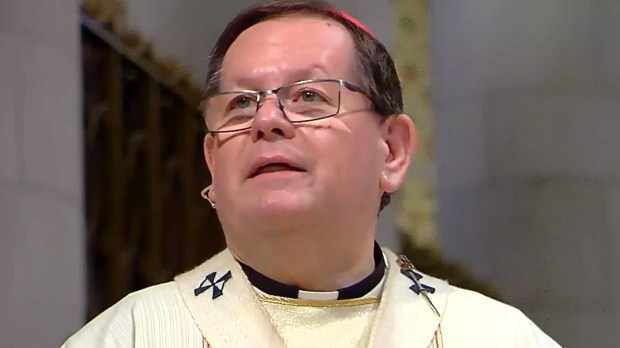Cardinal Gérald Cyprien Lacroix, archbishop of Quebec, participated in a meeting on the co-responsibility of lay people and religious organized by the Dicastery for the Laity, the Family, and Life at the Vatican from February 16 to 18, 2023. He explained to I.Media why the laity are “much more” than “collaborators” of priests and how necessary they are to the Church’s mission.
You’re one of the participants in this great congress that is discussing the sharing of responsibilities between priests and laity. In his introductory speech, Cardinal Kevin Farrell criticized the “attitude of superiority” of clerics that can exist in the Church and can prevent the laity from finding their place in it. Do you agree with this statement?
The Holy Chrism that we receive at baptism is the same one that is used to ordain priests and bishops, and for the sacrament of confirmation. There’s no superiority here: We are all anointed, and especially baptism and confirmation are what make us who we are. The question of superiority shouldn’t exist. We have different roles, different responsibilities, just like in a family. But we’re all equal before God. Learning to work together is essential.
It’s been 60 years since the Second Vatican Council and we’ve been thinking about these issues. It was revolutionary! Fr. Luis Navarro [rector of the Pontifical University of the Holy Cross, Ed.] emphasized in his speech this morning how much the Council has allowed us to set the record straight and to recall this communion, because we are all baptized.
Yes, there is still too much clericalism, too much feeling of superiority… Too often we think that the laity fit into one box and the ordained ministries into another box. But we’re all together! Pope Francis, when he talks about the role of bishops, who are pastors, explains that sometimes they’re in the front to lead the people, sometimes in the middle to be with them, and sometimes behind so that no one is left behind.
The Pope asks pastors to multiply themselves. Isn’t this call difficult to put into practice?
What the Pope is asking is to be with the people. I’ve seen some very beautiful experiences since the Council, where we carry the mission of the Church together. Lay people aren’t collaborators of priests; they aren’t at their service. It is much more than that. We carry the mission together, we reflect on it, discern it, and live it together. According to our responsibilities, of course. But we’ve come a long way on this.
As Cardinal Farrell said this morning, the Church is very large, spread over many continents with such diverse cultures. We aren’t on the same page. There are different social and cultural sensitivities and we must respect that. We have to let the Gospel convert us to Jesus’ way of seeing, to his way of being with his disciples and with people.
This “walking together” is the leitmotif of the great experiment underway in the synod on the future of the Church. Do you see this meeting as part of that synodal process?
I greatly welcome the audacity of holding this colloquium while we are in the middle of the synodal process. It had been planned well before the synod, and yet it fits perfectly into this process. We’d been thinking about this for a long time, but the pandemic didn’t allow us to do it before. We felt the importance of this theme of co-responsibility: The laity have much to learn from ordained ministers, and we, ordained ministers, have much to learn from the laity. It’s only together, by walking together, that we will succeed.
Where does the Church need lay people today?
We need the laity to be involved in the mission. Sometimes this mission is within our walls. We need catechists, evangelizers, people who will support and organize the community with the ordained ministers. We need committed baptized lay people at the heart of the mission in the world, in all spheres of human life. They are no less important in the Church if they are doctors, workers, or teachers… They are the Church where they are. And their witness is fundamental.
So where do we need lay people? Everywhere! Unfortunately, many people think that to be in the Church is to be in service, to be a reader, to hold a position somewhere in the Church. Yes, that’s part of it, and it’s fortunate that there are lay people with us ordained ministers to share our discernment and organize the mission.
In Quebec City, we have many people in pastoral work who have completed their theology studies, are committed, and work full time either in parishes, in specialized ministries such as prison ministry, or with the poor, and in diocesan services.
But we also have a host of lay people who are convinced that they’re missionaries in the heart of the world, and it’s our duty to support them. We must recognize their gifts, encourage their presence, and rejoice that they are at the heart of human, social, political and community realities, totally committed in the name of their faith.
Is there not also a confusion between the matter of power and authority and that of service?
Yes, we have an enormous challenge as a Church – not only the clergy – to form the whole people of God, laity and clergy, in this vision of co-responsibility. We must also help each one to discover their place. Some ordained ministers have not yet discovered, or have forgotten, the importance and respect to be shown to their lay brothers and sisters. Some laity have not discovered their place either… Or sometimes clerics do not make room for them.
There is also lay clericalism…
Yes, this exists, and it was mentioned this morning. There’s a lay clericalism in some circles that sometimes is worse than ours! Well, I wouldn’t say “worse,” but it’s there, for sure. There’s a huge challenge ahead of us, and I think this colloquium will help us to face it, but especially the synodal process that goes from 2021 to 2024. That’s a long time for a synod. That means that there’s a knot to untie, which we’re working on. There are hundreds of forums of welcoming, of listening, of sharing, of praying together… The synod has begun, we’re in it, and we’re already talking about things we’d never talked about together.
The lack of priests affects many countries in the northern hemisphere, but also other regions of the world, like the Amazon. Should we give more space to the laity because there aren’t enough vocations to the priesthood?
No. If we say that, we make the laity substitutes. And the laity are not substitutes in the Church, let’s be clear. They have a mission, a role to play in the Church.
Whether there are many priests or fewer, they have a role and must exercise it. But that doesn’t prevent the laity from being involved. When I was a parish priest in Latin America, I had 85 villages in my parish and I was the only priest. But in all the villages, in all the communities, there were delegates of the Word. Lay people, who were trained and spiritually accompanied, who gathered the community for the Sunday celebration of the Word, who accompanied the people over time. With 85 villages, I couldn’t celebrate Mass everywhere every Sunday! I went around constantly, to encourage them, to support them, but they were the ones who maintained the community.
Among the changes that some people in the Church have asked for, there has been talk of voting by the laity in synods. In Germany, the members of the national synodal path are asking for a permanent synodal council made up of lay people and bishops. What do you think of these proposals?
I know that these questions are being studied. I’m not up to speed on this reflection at the moment, even though I’m a member of the ordinary council for the Synod, and am part of the team that is helping to prepare. I’ll let the reflection go forward before I express an opinion on it. I find that there are many developments and that we’re in a period of listening and discernment. I won’t go any further today, not because I don’t want to answer, but because I want to continue to listen before giving my opinion.
In this meeting on co-responsibility, journalists aren’t allowed. Isn’t that a shame and a paradox?
We gave an outline yesterday at the press conference. I’m not part of the organizing team and didn’t decide this. I’ll give you my opinion: I think they’ve taken into account the presence of lay people who aren’t used to dealing with these issues. They don’t want the presence of journalists to impede spontaneity and freedom of speech, for fear of being questioned and quoted.


